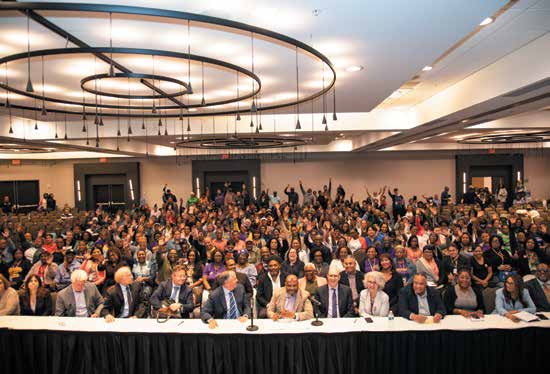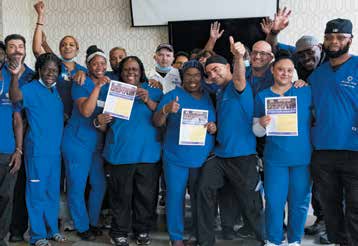Landmark Settlement
September 5, 2023
New York nursing home members secure historic wage increase.

Roughly 33,000 members will benefit from this landmark settlement following contract reopener negotiations in Uniondale, Long Island where a tentative agreement was reached on June 14.
Not only did members in the Greater New York (GNY) and “Group of 65” homes successfully negotiate pay increases of 7-percent this October (with retroactive pay- ments going back to July 1, 2023) followed by 6-percent and 5-percent in 2024 and 2025 respectively – but they also made significant progress towards safe staffing.
Announcing the agreement at the table, management lawyers acknowledged that if it were not for 1199ers’ dogged determination to press New York State Governor Kathy Hochul to increase Medicaid reimbursement rates, the dramatic increase in wages would not have been possible.
Polly Henry, an 1199 Delegate and Unit Clerk at Cold Spring Hills nursing home in Long Island, said this is the first time she remembers hearing attorneys say thank you.
“We got that money for them,” Henry said. “We won that money in Albany with shoe leather and broken feet. Some people were surprised that we were able to reopen our contract and win a strong settlement so quickly. I was not surprised. I knew that we had done what was needed to make it happen.”
Michelle Williams, an 1199 Delegate and Dietary Aide, who has worked at Split Rock Nursing Home in the Bronx for 25 years added, “We truly needed this wage increase. Everything is going up and our paycheck was not enough. It felt like we were living just a little above the poverty level. I was spending over $100 a week, and my grocery bag was smaller. This new money in our pockets will make a big difference to my family’s life.”

Agency staff are not only very expensive which makes it even harder for nursing homes to hire enough permanent staff, but they are also temporary. The short- term nature of their contracts undermines the continuity of care that residents need and also places an added burden on the permanently employed 1199 members who are constantly called upon to show them the ropes.
That’s why the Union is backing legislation brought by New York State Senator Gustavo Rivera and New York State Assemblymember Amy Paulin, which seeks to create economic incentives for nursing home management to employ fewer agency staff in the homes they run.
Not only was the prospect of this legislation an important factor in striking a contract deal
at the bargaining table—it’s also improving the morale amongst members who are, themselves, recovering from the effects of the pandemic. Reducing the reliance on agency staff is a significant step towards improving recruitment and retention of badly needed permanent staff.

